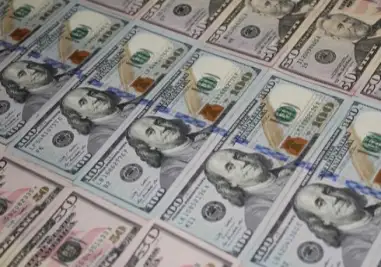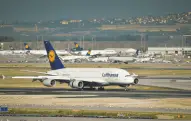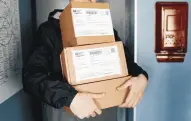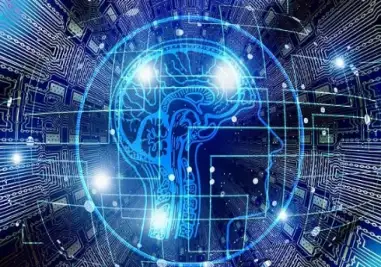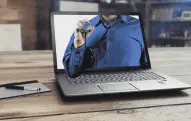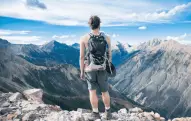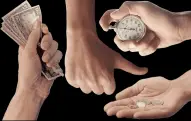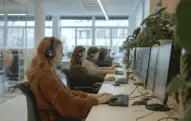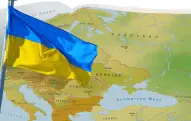Spies, memories and the Wall
East German spies from the infamous "Staatssicherheit", or Stasi in short, kept snooping on Stefan Rudolph's father, a Plant Manager in the German Democratic Republic. Stefan, a Mechanical Engineer who now lives in Hamburg, looks back at those days with some nostalgia and a whiff of trepidation in a conversation with The Munich Eye.
The secret police decided that the plant manager could not be trusted because of his "political opinion." Wolfgang Rudolph's 'Secret Service Dossier' said he needed to be kept away from others. This cost him his job. "We as a family crossed over from our hometown, Schwerin, in the East to a village called Moelln near Hamburg in 1984. It was an official 'outward' voyage," says Stefan. They would be allowed to shift to the West but without taking anything with them.
"We were told to leave within 24 hours."
His father sold the house and the Rudolph family took a train to Hamburg, crossing the border with papers that said they must not come back. "Few people were allowed to officially move to the West," remembers Stefan. "What my parents said in public and at private parties and festivals was vetted by the spies a million times before they told us to go," he says.
The family started life from scratch in the Capitalist West at Moelln, which was about 10km from the former West Germany-GDR border. Five years later, the Berlin Wall would fall, marking the biggest upheaval in Europe since the Second World War.
When the Wall fell on November 9, 1989, the family went near the border to watch thousands of East Germans waiting to cross over to the West. "Long lines of cars snaked across the border with exuberant people waiting to cross over. There was jubilation all around. We couldn't believe what we saw."
Six months later, the family revisited Schwerin in the former East. "It was hard to trust the situation and believe that the 'Easterners' won't throw us into jail," Stefan, who was about 14 then, says.
Before the Wall fell, the family had never thought they would meet their relatives in the West. We were surprised it all happened and each one of us was so happy, he says.
Martina, a soprano who met Stefan in 2006 and would later become his wife, helped those moving into Hamburg from the East settle down. Born and raised in the northern port city, she was elated to see so many people from the other side. There was a festival going on and for her it was a "dream and an adventure mixing with them," says Stefan, who works as a Sales Director at Max Kroenert Maschienenfabrik.
The school system, says Stefan, was built to promote a Communist view of the world. Everything about the West is bad and capitalism is the worst system, he remembers learning at school. Educated in the GDR till 14, he followed what he calls the 'mainstream' --the accepted political doctrine of the time. "I had to go to university and so I thought going by the current was the prudent thing to do, he reminisces.
His parents went back in 2002 to the former East where his father wanted to spend his retired life before he died in 2010.
Talking about reunification, Stefan believes it helped all Germans. "Those from the East won freedom while those from the West got united with the rest of the nation." The Rudolphs had relatives in the West like so many Germans who stayed on the other side of the Iron Curtain.
"Martina had never been to the East and we visited some eastern cities after 2006," remembers Stefan, who now moves across continents on frequent business trips.
                             *****************************************************************
Another German who lived in Niedersachsen, West Germany when the Wall fell recalls her experience of passing through the GDR checkpoints. She remembers her days at the university while telling TME how the reunification changed the face of the German capital.
Cornelia Neumann was at a club in West Berlin when she heard the Wall gates had been flung open. "When a friend announced it to me, it was hard to believe," she remembers, though there were reconciliatory noises coming from other side of the border for quite some time.
"So when Jan broke the news, we drove in his Volkswagen to the border to welcome GDR citizens trooping into West Berlin in their 'Trabi' cars." But the real significance of the event that transfixed the world would only sink in later in her life.
Amid Prestroika (restructuring) and Glasnost (openness) unleashed by Soviet leader Mikhail Gorbachev, signs of change were in the air. "Surprisingly, East German refugees had gathered in the West German embassy in Prague before being allowed to leave for the West via GDR. Hungary had been more and more liberal for those who wanted to leave for Austria and had opened parts of its borders for them." All this before the 'Berlin Wall moment' on November 9, 1989 signalled an imminent transformation.
Cornelia's father had been involved in the Protestant community and left the East in the 1950s. Being part of the denomination, he did not have any links with the Socialist regime there. Nor did his parents and sister, says Cornelia.
She remembers an uncle's future wife escape the East with a fake passport after the wall had been erected. "We had relatives in East Berlin and the coming down of the Wall made a lot of difference."
"The Allied Forces in the western part of Berlin had been informed earlier than the West Berlin police about what was about to happen that night . At least I have been told so. And they would not communicate with the West Berlin officials for some Allied-Forces rules. That seems strange to me," says the Humboldt University alumna.
The reunification changed not only the East but the West as well. Because of so many reasons the old West Germany doesn't exist any more, not only because we have heads of state who are from the former East, she says.
"I studied at the former East Berlin Humboldt University and stayed with my East German relatives, crossing the former border on a regular basis and travelling by train and car through the "GDR". The memories would come back. I would remember the checkpoints and the nasty East German border control officials when we used to "transit" through the then GDR by car with my mother and brother in the 1970s and 80s. She remembers the checkpoints in the middle of Berlin. "The S-Bahn station Friedrichstrasse, which I passed by every day to university, used to be a central border checkpoint." But all that had given way to glitzy shops and restaurants in the 1990s, making one forget it was only possible to cross the border with a visa before the Wall fell.
Her university had buildings that were hardly renovated since the 1950s or so. She lived in a part of Berlin with buildings showing bullet marks from the Second World War. This would have been unthinkable in the West, she believes. "I loved it though it scared me a bit, but it was all very fascinating. Now, everything is done up in style, very much unlike the mid-1990s."
What was once unimaginable had been achieved. Cornelia remembers a friend saying: "I have seen the GDR go down, therefore I know that everything is possible."

